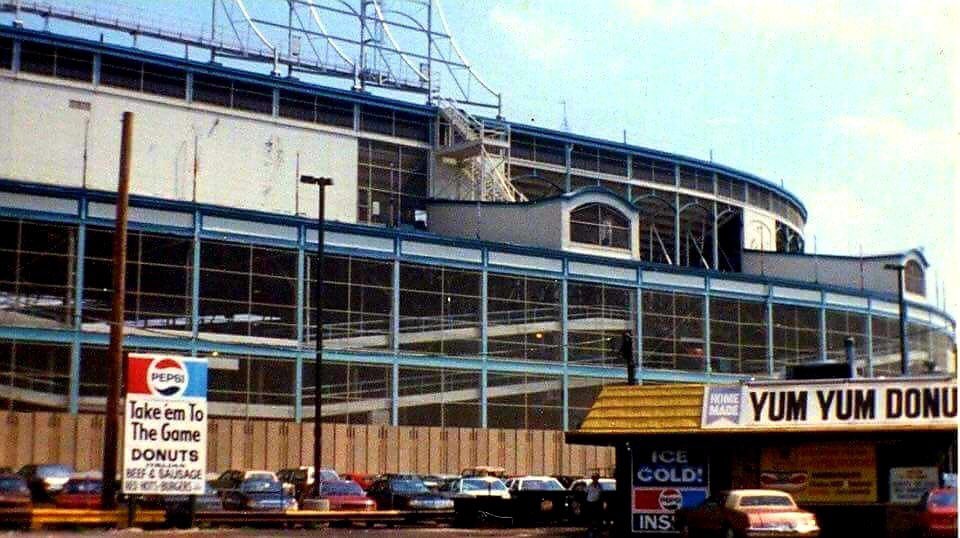A few years ago on a golf course, an older friend of mine took it upon himself to deliver an unsolicited lecture to a couple of young men on the subject of, “If You Didn’t See the 1967 Red Sox, You’ve Never Seen Baseball.” He prefaced his remarks with the self-canceling phrase, “Now look, fellas, I don’t want to sound like an old gaffer here …”
As one ages, one must actively work not to become an old gaffer. Or an old fart. Or an old bastard.
“Make America Great Again” was an effective political slogan because pretty much everyone over the age of 28 could relate to feeling that way occasionally. Younger, actually. Not long ago I listened to my teenage daughter and a contemporary of hers talk solemnly about the poor kids coming up these days, who didn’t get to enjoy any childhood years free from smart phones. Ah, a simpler time. If we each have an inner child, we also contain an inner curmudgeon.
One way I’m avoiding the impulse to harangue the present to be more like the past is: When I am tempted to wish aloud that everything was as it used to be when I was young and the world was full of impossible romance and possibility and wonder, I stop. And I actively, mindfully, meditatively cultivate gratitude that I was around to experience that version of the world before it disappeared.
I’ll give you a simple example, also from baseball. After college, I moved to Chicago primarily because I’d seen the Chicago Cubs on WGN cable TV and was fascinated by that crazy little ballpark, which seemed plopped down smack in the middle of an unassuming, unself-conscious city neighborhood. It seemed like a homely marvel—hallowed grounds in the middle of everyday streets. Once, I saw a mailman on his route outrace a bunch of neighborhood kids to get a home run ball that was bouncing down Kenmore Avenue!
The contradiction of Wrigley Field was deeply, endlessly fascinating to me and I couldn’t wait to see for myself if it was really like that.
When I first saw Wrigley Field in the summer of 1992—it was still really like that. One of the symbols of the place for me was the proximity to this iconic American landmark of an utterly unremarkable joint called Yum-Yum Donuts (outside which I once sat with my sister at a picnic table for a couple of hours in the cool April sun before a ballgame and got a sunburn so bad we both shivered all the way home on the El).

And the tickets were infinitely cheaper, as was the beer. And the ushers didn’t care if you moved down to better seats in the fourth inning. And there were fewer pretentious posers and more real baseball fans, some of whom kept their own score. And it was just like 1940, the old-timers all said.
Now? Attending a game is like attending the first Ali-Frazier fight. You have to save up for months, and you want to wear a mink coat. Tickets are hard to come by. Ushers are Pinkerton guards, protecting the impossibly rich fuckers who sit in cushioned box seats down by the field. I’ve talked to old guys who spent whole summers as kids, flipping up seats after the game in exchange for free tickets to the next day’s game. You can’t call baseball America’s pastime anymore with a straight face. You can’t.
And this is the scene where Yum-Yum Donuts used to be. As the plainspoken onetime Cubs manager Lee Elia might say: unassuming neighborhood, my fucking ass.

So what am I going to do, vandalize that goddamn hotel? Kick divots into the totes adorbs little beer garden field where the suburban dads play ball with their suburban kids before they go into the ballpark and sit in their suburban corporate skyboxes sipping IPAs? Produce hats that say “Make Wrigleyville Yum-Yum Again”?
No: For my own well-being, I’m going to choose to be damned glad I saw the place when Yum-Yum Donuts was still there and Wrigley Field was still genuinely beguiling, rather than a corporate creation, like “Cubs Nation.” I’m going to cherish the memory gratefully, not lament it bitterly.
When I tell young people about it, if I’m compelled to do so, I will do it from the perspective of a sweet thing remembered, not a youthful joy stolen. And if I sound sentimental to those young people, I want it to be the sentiment of sorrow that they never got to experience the thing, without a whiff of anger that I don’t get to experience it anymore.
I got to experience it, and if I want to do so again, all I have to do is get another sunburn, in another cool April sun. So I should be thankful.
I’m going to try to remember my whole life that way, in fact—as consciously as I can, for as long as I can, all the way up until the end, if I can.
Wonderful. But, you should of seen those ‘67 Red Sox.
Ladies and gentlemen, now entering the ballgame, the old gaffer himself, Tony Judge!
Nice.
Speaking of the Good Ol’ Days at Wrigley, when I went to UIC my brother & I had an apartment @ Grace & Seminary, a block N of the ballpark. The Cubs actually let us park in their narrow lot (which is still there) *for free* when the Cubs were out of town. One day in 1987 I got back from school & my car was gone. I was so furious I stormed over to the ballpark & opened the first door I came to, right across from Yum Yum.
Incredibly, I had entered the Cubs’ corporate offices. I see “VP of Operations” over an open office door & walked in. The exec behind his desk, startled, looked up at me as I exclaimed “You let us park in your lot, and now you’re towing us away?!” He took a breath & responded “We put notices on the cars (they were repaving or some maintenance).” I told him I didn’t get a notice, and gave him my (true) sob story that I was a starving student. He told me to sit down & tossed me a pad of paper & pencil, and asked me to write down my name & address. The Cubs sent me a check for $50, the towing fee. I could hardly believe it. The VP could’ve just called security & tossed me out, but he amazingly took pity on poor little me. A Cubs class act, that’s for sure.
When I went back to Chicago in 2018 (I’m now an ex-FIB in the Great Pacific Northwest), I visited the old ‘hood before a Cubs’ night game. The door I had entered 30+ years before was no longer. The Ricketts had revamped not just the area around Wrigley, but the offices themselves. It was almost like a dream — had there ever really been a door to Cubs’ top brass there? Your Honor, I swear on a stack of scorecards that this story is true. And yes, back in the day I ate at Yum Yum. Good times!